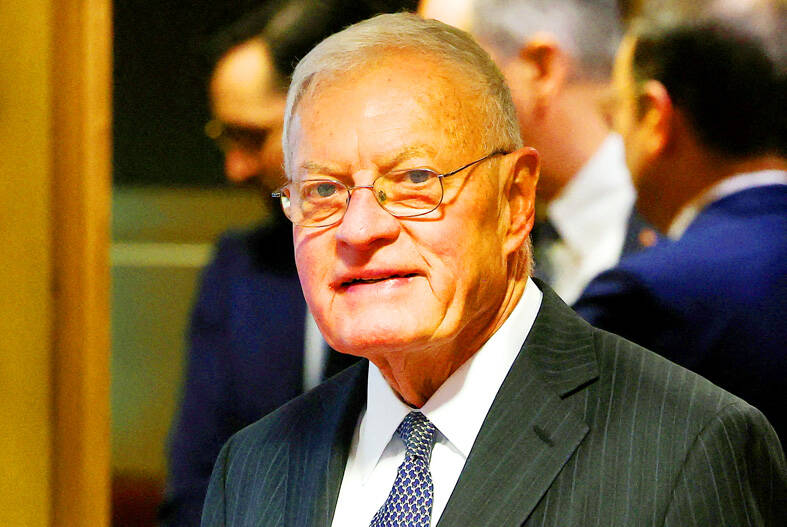Keith Kellogg, US President Donald Trump’s special envoy to Ukraine, suggested British and French troops could adopt zones of control in the country, in an interview with The Times newspaper published yesterday.
Kellogg suggested they could have areas of responsibility west of the Dnipro River, as part of a “reassurance force,” with a demilitarized zone separating them from Russian-occupied areas in the east.
“You could almost make it look like what happened with Berlin after World War II, when you had a Russian zone, a French zone, and a British zone, a US zone,” he said, later clarifying on X that the US would not be providing troops.

Photo: REUTERS
“You’re west of the [Dnipro], which is a major obstacle,” Kellogg said, adding that the force would therefore “not be provocative at all” to Russia.
He suggested that a demilitarized zone could be implemented along the existing lines of control in eastern Ukraine, The Times said.
A retired lieutenant general and former acting national security adviser during Trump’s first term, Kellogg, 80, said Ukraine was big enough to accommodate several armies enforcing a ceasefire.
To make sure that British, French, Ukrainian and other allied forces do not exchange fire with Russian troops, a buffer zone would be needed, Kellogg said.
“You look at a map and you create, for lack of a better term, a demilitarized zone [DMZ],” he said.
“You have a ... DMZ that you can monitor, and you’ve got this... no-fire zone,” Kellogg said.
However, “now, are there going to be violations? Probably, because there always are, but your ability to monitor that is easy,” he added.
Kellogg admitted that Russian President Vladimir Putin “might not accept” the proposal.
Kellogg later clarified his position on X.
“I was speaking of a post-ceasefire resiliency force in support of Ukraine’s sovereignty. In discussions of partitioning, I was referencing areas or zones of responsibility for an allied force (without US troops). I was NOT referring to a partitioning of Ukraine,” he said.
The UK and France are spearheading talks among a 30-nation “coalition of the willing” on potentially deploying forces to Ukraine to shore up any ceasefire Trump might strike.
London and Paris describe the possible deployment as a “reassurance force” aimed at offering Ukraine some kind of security guarantee.

ACTION PLAN: Taiwan would expand procurement from the US and encourage more companies to invest in the US to deepen bilateral cooperation, Lai said The government would not impose reciprocal tariffs in retaliation against US levies, President William Lai (賴清德) said yesterday, as he announced five strategies to address the issue, including pledging to increase Taiwanese companies’ investments in the US. Lai has in the past few days met with administrative and national security officials, as well as representatives from various industries, to explore countermeasures after US President Donald Trump on Wednesday last week announced a 32 percent duty on Taiwanese imports. In a video released yesterday evening, Lai said that Taiwan would not retaliate against the US with higher tariffs and Taiwanese companies’ commitments to

Intelligence agents have recorded 510,000 instances of “controversial information” being spread online by the Chinese Communist Party (CCP) so far this year, the National Security Bureau (NSB) said in a report yesterday, as it warned of artificial intelligence (AI) being employed to generate destabilizing misinformation. The bureau submitted a written report to the Legislative Yuan in preparation for National Security Bureau Director-General Tsai Ming-yen’s (蔡明彥) appearance before the Foreign Affairs and National Defense Committee today. The CCP has been using cognitive warfare to divide Taiwanese society by commenting on controversial issues such as Taiwan Semiconductor Manufacturing Co’s (TSMC, 台積電) investments in the

HELPING HAND: The steering committee of the National Stabilization Fund is expected to hold a meeting to discuss how and when to utilize the fund to help buffer the sell-off The TAIEX plunged 2,065.87 points, or 9.7 percent, to close at 19,232.35 yesterday, the highest single-day percentage loss on record, as investors braced for US President Donald Trump’s tariffs after an extended holiday weekend. Amid the pessimistic atmosphere, 945 listed companies led by large-cap stocks — including Taiwan Semiconductor Manufacturing Co (TSMC, 台積電), Hon Hai Precision Industry Co (鴻海精密) and Largan Precision Co (大立光) — fell by the daily maximum of 10 percent at the close, Taiwan Stock Exchange data showed. The number of listed companies ending limit-down set a new record, the exchange said. The TAIEX plunged by daily maxiumu in just

‘COMPREHENSIVE PLAN’: Lin Chia-lung said that the government was ready to talk about a variety of issues, including investment in and purchases from the US The National Stabilization Fund (NSF) yesterday announced that it would step in to staunch stock market losses for the ninth time in the nation’s history. An NSF board meeting, originally scheduled for Monday next week, was moved to yesterday after stocks plummeted in the wake of US President Donald Trump’s announcement of 32 percent tariffs on Taiwan on Wednesday last week. Board members voted to support the stock market with the NT$500 billion (US$15.15 billion) fund, with injections of funds to begin as soon as today. The NSF in 2000 injected NT$120 billion to stabilize stocks, the most ever. The lowest amount it